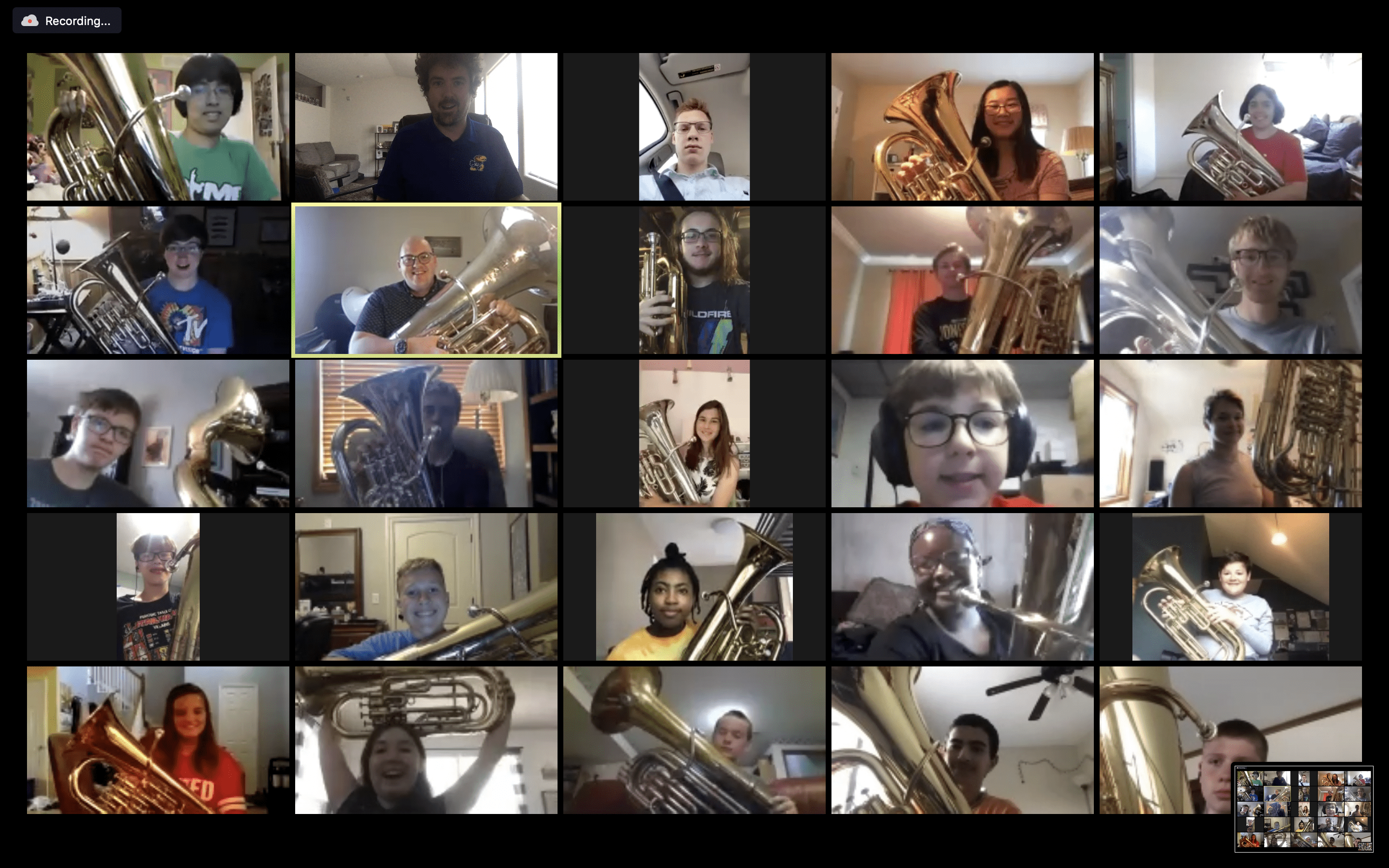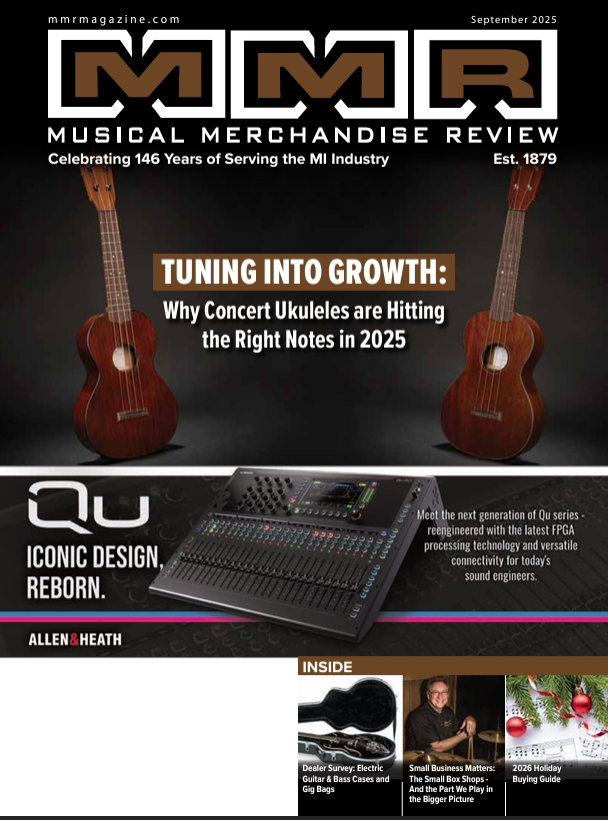 As music recording began moving into the DIY realm 30-some-odd years ago, MI retail responded by establishing its own footprint in that category. What began with a Tascam PortaStudio and some mid-priced condenser microphones eventually blossomed into entire departments and in some cases separate shops dedicated to pro audio; in a few instances, some MI retailers even set up recording studios of their own, less as profit centers in and of themselves than as ways to demo the growing range of pro-audio products.
As music recording began moving into the DIY realm 30-some-odd years ago, MI retail responded by establishing its own footprint in that category. What began with a Tascam PortaStudio and some mid-priced condenser microphones eventually blossomed into entire departments and in some cases separate shops dedicated to pro audio; in a few instances, some MI retailers even set up recording studios of their own, less as profit centers in and of themselves than as ways to demo the growing range of pro-audio products.
In the last decade or so, however, recorded music has been taking a back seat to live performance, as musicians find their living increasingly focused on the stage and on the road instead of the studio or the spare bedroom. Some MI retailers have responded accordingly, creating rehearsal spaces large enough for bands, accommodating this sea shift in the fortunes of music. In the process, they’re again creating another level of contact with customers, communicating that they understand the shifting sands of music’s business and technology, and establishing an opportunity to present them with new products in a realistic environment.
It’s not as straightforward a proposition as putting in a pro-audio department; rehearsal services are at least as space-dependent as a recording studio would be, and usually far more so, since multiple rehearsal rooms are often necessary to achieve sufficient ROI. On the other hand, the equipment and technology investments are substantially less, though the wear-and-tear factor is decidedly higher in the rehearsal business. On balance, a number of MI stores have found that the synergy between retail and rehearsal is solid enough, and the trends of the moment in music are clear enough, to make the move.
Musicians Increasingly Rely On Gigs Rather Than Recordings Victor Litz Music Center got its initial traction with the arrival of the Beatles, as Tony Litz, the second-generation owner of the Gaithersburg, Maryland store founded in 1961, likes to point out.
The shop presciently purchased more space about 20 years ago in the building it’s housed in, part of the city’s historic Olde Towne district, across the street from a 120-year-old but still-busy train station. The potential for external noise gave them some pause about putting in a small recording studio at the time, but a decade later they set up part of the 10,000-square-foot building as an approximately 600-square-foot rehearsal studio. It joined the 18 smaller practice rooms that are part of the store’s education program, and the larger studio still houses its regular Academy of Rock teen and adult band nights. But it also presented an opportunity to leverage the need for rehearsal space by area musicians who were increasingly relying on gigs rather than recordings. Litz says the rehearsal business isn’t a huge part of his revenue; the large studio costs users $25 for the first hour and $20 per hour thereafter, while the practice rooms go for $10 per hour. But the ancillary benefits are real and considerable.
“When they use the rehearsal studio, they not only buy strings and picks here but they remember us for sound systems and other major pro-audio purchases, so it’s definitely helped the retail side,” he says. Manufacturers have also found the rehearsal side of the store to be a branding opportunity; several, including Roland/ Boss, Pearl, and Yamaha have provided gear for the studio’s backline, which it includes, along with a sound system, as part of the room’s rental. Litz says they don’t go out of their way to foster such connections, but that they occur organically when sales reps visit the store. “There’s a pretty obvious value to them to be in front of lots of different musicians using their equipment,” he points out.
Litz says the store doesn’t advertise the rehearsal service other than some in-store signage, social media posts, and on its own website. “Word gets around pretty good,” he says, adding that they’ve attracted a number of regular customers, including the auditions for the two editions of the Trans-Siberian Orchestra touring band.
A Way For Brick & Mortar To Counter Online Sales
Rudy D’Agostino has owned and operated The Music Complex’s Pawtucket, Rhode Island location for 25 years. When he purchased the building, it already had a sizable rehearsal-studio business, one he expanded now to 20 practice and rehearsal spaces ranging from 100 to 400 square feet with some renting for $20 or more an hour and others rented on a monthly basis, as well as building a recording studio. The music-store side of the location was an outgrowth of that, with an inventory built based on demand from the rehearsal-studio clientele.
“I began with a small accessories store, and we began adding guitars and amps and that grew and grew and we were using more and more of the building for retail,” he says. The retail business reached an inflection point in 2013 when he opened a second, stand-alone MI store in nearby Smithfield, Rhode Island, which also has lessons and instrument/equipment rentals, while keeping the store in Pawtucket in place with the studios.
D’Agostino says most of his customers for both sides of the business are very local, to the point where many of his longer-term lockout rehearsal-studio rental clients are able to drop off their equipment after gigs after the studios close at 10 or 11 o’clock each evening.
The combination of retail and rehearsal offer mostly intangible synergies, but nonetheless valuable ones. At a time when retail is starkly challenged by online shopping portals that offer many of the same MI products that stores do, D’Agostino says the studios are a way for brick and mortar to counter that – Amazon cannot provide rehearsal space for bands. At least, not yet.
“The idea was to have everything under one roof – rehearsals, rentals, lessons, retail,” he says. “It was pretty unique when we started, and it still is.”
Going Large
Like much else that Guitar Center takes on, its initiative around rehearsal space is on a national scale. Currently, 285 of the chain’s 295 stores have implemented its Lessons program, begun in 2011, each with a small or mid-sized rehearsal room fitted with a drum kit, a keyboard and amplifiers.
However, in 2017-2018 GC set up multi-room rehearsal facilities at stores in eight cities, including Louisville, New Orleans, Omaha, and Emeryville, California that are closer in size and scope to typical commercial rehearsal facilities, with spaces ranging from 350 to 550 square feet. These are available to both GC Lessons students and the public, and come with a stage and lights. They also offer ancillary services, such as built-in CD recording systems using ceiling-embedded Shure microphone arrays in each rehearsal studio, mixed through the room’s FOH console. Rehearsal rates, which vary according to location, include one CD-R copy, with additional copies available and additional cost.
Locations with enhanced rehearsal facilities were chosen largely based on the availability and cost of the additional space needed for them, as well as input from local store management. Donny Gruendler, Guitar Center’s vice president of music education, says the build-out of larger rehearsal rooms is attributable in part to the current emphasis on live performance, but that it is more fundamentally an integral part of the retailer’s national education initiative. “Once they learn their instruments, it’s only natural that students will want a place where they can get together and play them,” he explains. “We also want to be more than a retailer to the communities we serve.”
Gruendler says that the rehearsal spaces also act as ways for students to experience a wide range of equipment and instrument possibilities, which often do lead to sales down the line. “We do partner with brands for that reason in the rehearsal rooms,” he says. “That’s why we don’t put just one type of drum kit or amp in the rooms. We encourage [customers] to try different options, so that when they’re ready to purchase they can make informed decisions.”
Rehearsal services aren’t for every retailer. Their most essential requirement is space, which is increasingly at a cost premium in many parts of the country where real estate prices continue to spiral upwards, as do the property taxes that accompany them. Operational costs include near-round-the-clock staffing, and higher utilities bills. But the shift in the music industry’s revenue model has prompted a massive build-out of rehearsal infrastructure to accommodate all of the musicians who now rely on tickets instead of CDs for income. That’s what’s supporting “destination” rehearsal venues such as Nashville’s 162,000-square-foot Soundcheck, Chicago’s 165,000-square-foot Fort Knox, and the mind-boggling 250,000 square feet of space at Rock Lititz in Lancaster, Pennsylvania, where artists like Taylor Swift, Usher and U2 prepare for yours on a 30,000-square-foot main stage. (And it’s where Tone Tailors, a Lancaster Michigan shop, has taken a 4,000-square-foot space on the Rock Lititz campus).
Very few can come anywhere close to that kind of scale, although Japan’s largest MI chain, Shimamura Music, includes rehearsal studios in most of its 160-plus locations. But shifts in the music business are making rehearsal services an attractive value-add for a growing number of stores for a lot of very good reasons.



























